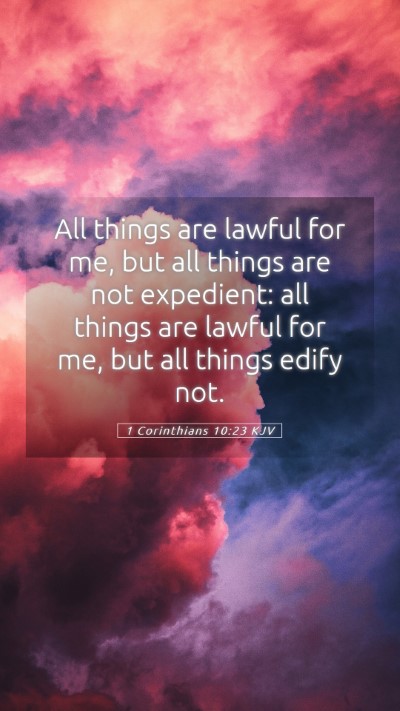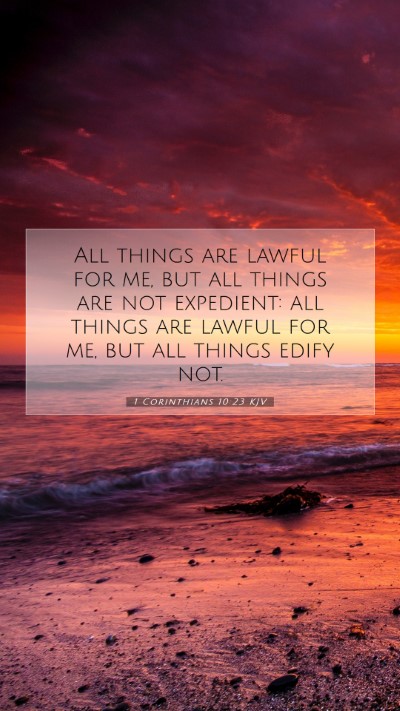Understanding 1 Corinthians 10:23
In this passage, the Apostle Paul states, "All things are lawful for me, but all things are not expedient: all things are lawful for me, but all things edify not." This verse serves as a profound illustration of the balance between Christian freedom and responsibility. Below, we explore the meaning of this Bible verse through insights from public domain commentaries and provide a comprehensive understanding of its implications for believers.
Bible Verse Context
The context of 1 Corinthians 10:23 is crucial for proper exegesis. Paul discusses the nature of Christian liberty amidst challenges faced by the Corinthian church, which struggled with issues of idolatry and moral responsibility. Understanding Scripture requires us to consider how Paul addressed both the rights and the responsibilities that come with freedom in Christ.
Bible Verse Meanings
- Christian Freedom: According to Matthew Henry, Paul acknowledges the freedoms granted to believers, stressing that while all things may be permissible, they may not always lead to beneficial outcomes. This highlights that freedom in Christ should not lead to indulgence but rather to constructive behavior.
- Expediency vs. Liberty: Albert Barnes emphasizes the distinction Paul makes between what is lawful and what is expedient. Laws and regulations in a believer's life must culminate in promoting personal and communal growth, suggesting that one must weigh choices for their impact on others.
- Building Up Others: Adam Clarke points out that the ultimate goal of Christian life is edification. This means that believers are called to consider their actions and choices in light of their effects on their community and fellow believers.
Detailed Insights
In addressing the “lawfulness” of actions, Paul implies that mere permission to act is insufficient for guiding behavior. He insists that believers need to apply discernment. This principle is echoed in various commentary interpretations:
- Henry notes that while Christians are not under the law's constraints, their actions should be evaluated on how they serve the greater good.
- Barnes reminds us that Christian liberty carries with it a weight of responsibility towards others, prompting believers to act not unto themselves, but for the collective benefit.
- Clarke emphasizes that the choices we make should reflect our commitment to Christ and contribute positively to our relationships within the church.
Application of Bible Verse
The practical implications of 1 Corinthians 10:23 are significant for contemporary believers:
- Consideration in Actions: Each action should be weighed against its potential to benefit or harm others, especially in the context of spiritual health and community harmony.
- Leadership in Christian Communities: Leaders should model behaviors that edify rather than draw attention to personal freedoms.
- Moral Choices: Individuals are encouraged to think critically about how their freedom to act aligns with the call to love and serve others.
Additional Cross References
- Romans 14:19: "Let us therefore follow after the things which make for peace, and things wherewith one may edify another."
- 1 Corinthians 6:12: "All things are lawful unto me, but all things are not expedient: all things are lawful for me, but I will not be brought under the power of any."
- Galatians 5:13: "For, brethren, ye have been called unto liberty; only use not liberty for an occasion to the flesh, but by love serve one another."
Concluding Thoughts
1 Corinthians 10:23 encapsulates a critical aspect of Christian living: the necessity of aligning one's liberties with the call to edify others. The analysis provided serves as a guide in Bible study groups, online Bible study, and other communal or personal study methodologies. This exploration encourages proactive engagement in discussions around Bible verse meanings, Bible verse interpretations, and more, deepening understanding of the balanced approach to Christian freedom that Paul exemplified.
As we seek to apply the profound truths of Scripture to daily life, may we constantly ask ourselves: How can my actions reflect Christ’s love in both freedom and responsibility?


